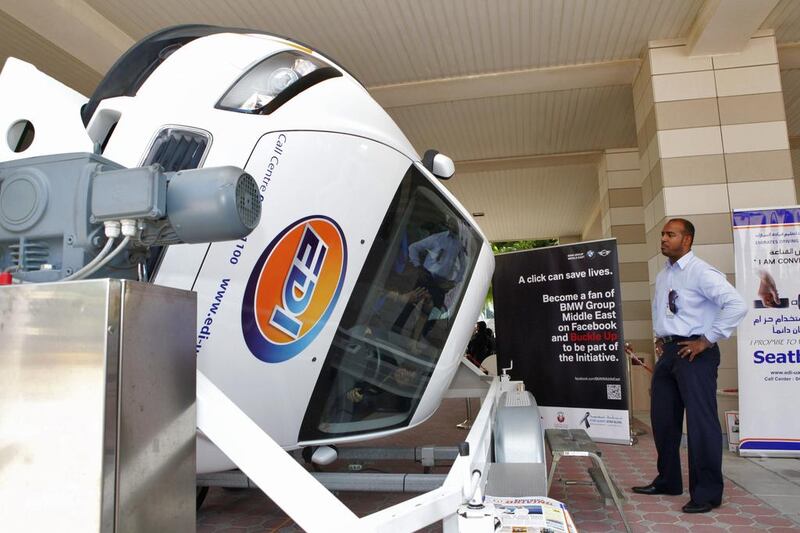I refer to Hareth Al Bustani's blog post, Unbuckled seat belts and reckless driving: UAE's dangerous cocktail (October 1).
It refers to a survey by The National and Al Aan TV that showed how far we still have to go when it comes to road safety.
Specifically, it revealed almost four in 10 UAE residents were happy to drive with a child on their lap. About 80 per cent of drivers said they always buckled up and 73 per cent of front-seat passengers did the same.
Shockingly, however, only 15 per cent of back-seat passengers always wear seat belts.
Of the excuses given, the most ludicrous was not liking how seat belts look. The one I empathised with the most was that some people just forgot. I can understand that, as I sometime forget to do things.
However, putting on a seat belt has become a habit for me; I’ve prioritised it so highly and repeated the process so often that it’s impossible to forget.
Andy Querouz, Sharjah
I believe there are not enough police and certainly not enough real punishment for driving too fast or causing accidents.
I am still stunned that the drink-driver who caused the death of Dubai triathlete Roy Nasr was only sentended to one month in jail.
In the absence of stricter laws against anyone who speeds, is drunk while driving, is not wearing a seat belt or has children on his or her lap in the front seat, then too many innocent people are going to be killed.
Brigitte von Bulow, Abu Dhabi
There are too many children jumping around on car seats and off dashboards.
L Duffin, Dubai
Forgotten Miss America entrant
I refer to the Desi Girl column, New Miss America Nina Davuluri might not make the cut in India (September 30).
There were two dark-skinned women of Indian descent competing in Miss America.
Bindhu Pamarthi was Miss District of Columbia, and her achievement was also extraordinary.
Name withheld by request
Rahul Gandhi is an untested leader
I am writing in reference to Can Gandhi fulfil the hopes of masses? (October 4).
The possibility is remote, for the simple reason that despite his strong dynastic background, Rahul Gandhi will have to face insurmountable opposition from within his own party and his other political allies.
The Gandhi dynasty has been allowed to rule only so long as it, along with its coterie, ignores the corruption that is deeply rooted in the system.
He may have won the first round by ensuring the withdrawal of an ordinance designed to overturn a judicial ban on criminals sitting in parliament, but he has surely stepped on the tails of sleeping tigers.
CS Pathak, India
Even though he has vetoed an ordinance allowing criminal politicians to sit in parliament, Rahul Gandhi’s personal ability as a leader is still unproven.
His policies on corruption are good, but neither he nor any of his Congress party members have taken any initiative to eradicate the corruption menace.
He is from the Gandhi family, but there are no records to indicate his capacity as an administrator. He has not handled any portfolio.
Indians cannot expect a miracle from him.
K Ragavan, India
Too many states bad for a nation
I am writing about India bows to campaign for new state of Telangana (October 5).
The Indian cabinet’s recent decision to allow the creation of Telangana, by dividing Andhra Pradesh state, is against the concept of “unity in diversity”.
India, which is home to people of different religions, languages and ethnic groups, has historically been an exemplar of this concept.
The prolonged protests in Andhra Pradesh have cost the national treasury several million dollars.
It is true that people in the designated Telangana state have suffered from discrimination by the state and federal administrations.
However, several new states have been created over the past decade, and the demand for them is continuing.
Disappointingly, this has diverted attention from more important issues concerning the national economy.
Ramachandran Nair, Oman





